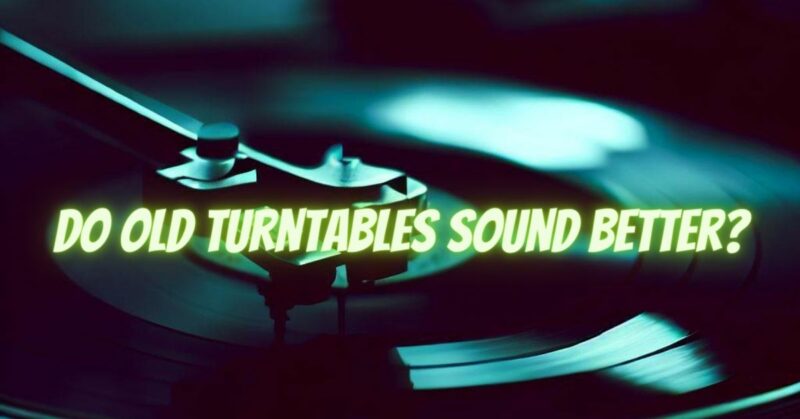In the world of audio enthusiasts, the allure of vintage equipment, particularly old turntables, has a unique charm that transcends the passage of time. As vinyl experiences a resurgence in popularity, audiophiles often find themselves drawn to the warm, nostalgic sound associated with vintage turntables. This article seeks to explore the intriguing question: Do old turntables truly sound better, and what elements contribute to their enduring appeal?
The Analog Legacy:
Old turntables, often hailing from the golden era of vinyl in the mid-20th century, possess a certain character that distinguishes them from their modern counterparts. Analog technology, prevalent in vintage turntables, operates on the principle of physical mechanics and electronic components. This analog approach is celebrated for its warmth, richness, and the unique sonic characteristics it imparts to the music.
Build Quality and Craftsmanship:
One of the primary reasons old turntables are often associated with superior sound quality is the exceptional build quality and craftsmanship inherent in their design. During the mid-20th century, manufacturers took great pride in producing turntables with robust materials, precision engineering, and attention to detail. The result was a generation of turntables that, even decades later, continue to impress with their durability and reliability.
Vintage Cartridges and Styluses:
The cartridges and styluses used in old turntables contribute significantly to their distinctive sound. Many vintage turntables come equipped with cartridges that were renowned for their tracking ability and fidelity. While modern cartridges have certainly advanced in design and materials, the unique tonal characteristics of vintage cartridges, coupled with the nostalgia they evoke, make them a sought-after component for enthusiasts.
Analog Warmth and Musicality:
One of the defining features of old turntables is the analog warmth they impart to the music. Analog systems are characterized by a smooth and continuous sound wave, as opposed to the discrete steps in digital reproduction. This analog warmth is often described as a certain musicality, with vinyl records delivering a more organic and lifelike representation of the recorded sound.
Nostalgia and Sentimental Value:
Beyond technical specifications, the appeal of old turntables is undeniably intertwined with nostalgia and sentimental value. Many enthusiasts find joy in owning and using equipment that carries a piece of history, connecting them to a bygone era of music consumption. The tactile experience of handling vinyl records and the mechanical engagement of a vintage turntable add to the overall enjoyment of the listening experience.
Challenges and Considerations:
While the charm of old turntables is undeniable, it’s crucial to acknowledge the challenges that come with vintage equipment. Wear and tear, maintenance issues, and the potential for outdated technology are factors that must be considered. Additionally, the availability of replacement parts for vintage turntables may pose challenges for those seeking to keep their cherished equipment in optimal condition.
The question of whether old turntables sound better is a subjective journey into the realms of nostalgia, craftsmanship, and sonic character. While modern turntables offer advanced features and technology, the enduring appeal of vintage turntables lies in their ability to transport listeners to a different era of music consumption. Whether driven by a passion for analog warmth or a fondness for the aesthetics of a bygone era, the choice between old and new turntables ultimately rests on the individual’s preferences and appreciation for the timeless allure of vintage audio equipment.

